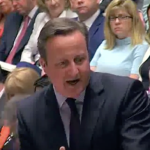When David Cameron presented, to the House of Commons, his explanation for the England riots in August – “It was common or garden thieving robbing, or looting, and we don’t need an inquiry to tell us that” – he ensured that we would not get a governmental view of the underlying causes, and therefore significantly increase the chances of it happening again.
Fortunately, the Guardian newspaper haven’t taken ‘thugs’ for an answer, and set up their own inquiry, the results of which were published yesterday. ‘Reading the Riots’ is a thorough, objective, piece of research.
It concludes that, yes, there was a great deal of opportunism behind some of the looting (what one commentator described as ‘shopping with violence’). But it also suggests that there were recurring themes emerging in interviews with the rioters:
- a deep anger and resentment of current policing tactics in our inner cities, particularly from those of ethnic minority backgrounds (how long have we heard this);
- a feeling, from young people, of being abandoned by government – the withdrawal of the education maintenance allowance, the sharp rise in youth unemployment, and the closure of youth services, due to the public sector cuts;
- a sense of economic inequity, with the ‘rich getting richer, and the poor getting poorer’.
These seem, to me, to be plausible explanations.
But I wonder if there’s another factor, not highlighted in any media analyses that I’ve seen, which connects the riots with the student tuition fee protests, also seen in London, the Arab Spring, and the Occupy Movement? It’s simply this: we do it, because we can.
On one level, you could dismiss this as a juvenile prank. But, thanks to YouTube, this arrest evasion tactic has already spread around the thousands of other Occupy sites, and there’s a tangible frsutration from the police that they are being made to look stupid, and an equal thrill from protesters, that they are harnessing collective knowledge to create a sense of agency.
And, that’s the take-away lesson for education in the Guardian’s excellent summary. If young people – especially those from socially deprived inner-city communities – are feeling disempowered and frustrated, what can we do to restore a sense of agency in their learning, and thus, hopefully prevent further riots? Because it was the fact that they could take action in the riots – even if they weren’t proud of some of those actions, later – that made them so intoxicated. We need learning them enables them to do things, not just remember stuff.
Regular readers of this blog will knowhow passionate I am about project-based learning as a tool to give young people a sense of agency. Apps for Good is another small, but important example. Young unemployed people are given the training needed to create mobile apps for social good. You can’t help wondering if any of the apps programmers felt sufficiently disenfranchised that they took part in the August riots – I suspect they didn’t.
And you wonder when, or if, the government will realise that it’s a better use of public money to invest in learning and training which allows people to feel they have some sense of agency in their lives, rather than to lock up rioters at a cost of over £50,000 each per year. There’s little sign of any appetite to change tack, but the government would be well advised to take heed of one chilling stat in the Guardian report: 4 out of 5 rioters think another riot is inevitable.
Understanding less and talking tough on TV might win a few votes, but it could end up costing us all a lot of money.




Hi David, good to read your ideas as ever. Are you in Melb on Dec 18th by any chance? If so, I have an invitation for you.
GIllian,Was there last week. No plans to go back soon, so sorry. But intrigued!
It’s my annual carol-singing party (with feast beforehand)! Just thought it might line up. Enjoy your Christmas and New Year in Sydney then!